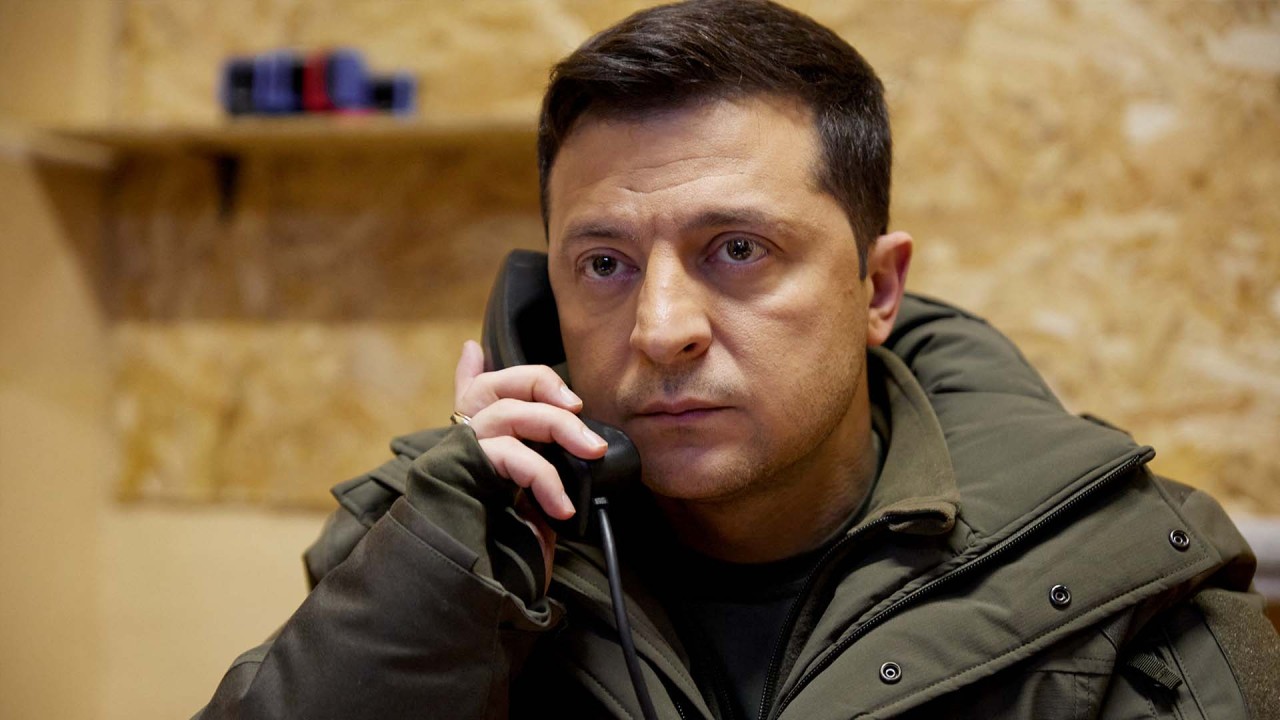
Ukraine invasion: Zelensky calls for Britain to label Russia ‘terrorist state’
- Zelensky asks Britain to increase sanctions pressure, keep Ukrainian skies ‘safe’ in push for no-fly zone
- Plea comes amid dispute over the pace of Britain’s visa programme for Ukrainian refugees and as UK joins US in banning oil imports from Russia
In a historic speech to the House of Commons, Zelensky also asked the United Kingdom to “make sure Ukrainian skies are safe” as he continues to pressure Western leaders to establish a no-fly zone over Ukraine. He said that 50 Ukrainian children and more than 10,000 Russian soldiers have been killed since the fighting began.
“We will not give up, and we will not lose,” said Zelensky, evoking the famous World War II vow of prime minister Winston Churchill. “We will fight to the end, on the sea, in the air. We will fight for our land whatever the cost. We will fight in the forests, in the fields, on the shores, in the streets.”
Zelenksy’s address, via video link and in Ukrainian with simultaneous translation, was the first time a foreign leader had spoken by broadcast in the Commons. Foreign leaders traditionally deliver their addresses in Westminster Hall or the Royal Gallery at Parliament.
Last week, Zelensky received a standing ovation and a translator was in tears after a speech to the European Parliament. He received two standing ovations in the Commons on Tuesday.
Prime Minister Boris Johnson’s government has been criticised for the pace at which it has sanctioned officials with ties to Putin and tackled wealth held by Russian oligarchs in Britain.
According to the government, Britain has sanctioned more than 300 individuals and businesses over the Ukraine invasion in recent weeks, including freezes on the personal assets of Putin and Russian Foreign Minister Sergey Lavrov.

“Britain and our allies are determined to press on, to press on with supplying our Ukraine friends with the weapons they need to defend their homeland, to press on with tightening the economic vice around Vladimir Putin,” Johnson said in the Commons following Zelensky’s speech.
“We will employ every method that we can – diplomatic, humanitarian and economic – until Vladimir Putin has failed in this disastrous venture and Ukraine is free once more.”
On Tuesday, Britain joined the United States in banning oil imports from Russia, saying it would ban the importation of Russian oil and oil products by the end of the year.
How will a US ban on Russian oil help Ukraine?
The EU, which is more reliant on Russian oil, also said it would cut its purchases of Russian gas by two-thirds by the end of 2022.
The moves came as oil giants Shell and BP said they would further pull back from Russia, with Shell shutting its gas stations in the country. Brent crude prices rose more than 7 per cent on Tuesday following the announcements.
Zelenksy’s speech came amid a dispute over the British government’s visa programme for Ukrainian refugees.
The programme allows extended family members fleeing the Russian invasion to join relatives in Britain, but has been criticised over Home Secretary Priti Patel’s insistence that security checks be carried out on applicants, as well as the pace at which visas are being granted.
On Tuesday, Foreign Secretary Liz Truss said the UK was preparing to open a “pop-up” visa application centre for Ukraine refugees in Lille, France.
Patel has been reluctant to set up a visa processing centre in Calais, the closest crossing point from France into Britain, saying “people-smuggling gangs are roaming around Calais”. She had said a “bespoke” visa application centre would be set up “en route to Calais”.
“It’s absolutely right that we have the right processes in place to check people and to safeguard people,” Patel told the Commons on Monday.
Ben Wallace, the defence secretary, separately pledged that members of the military would be available to provide help to expedite the application process.



